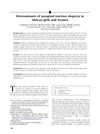Hair Care Practices and Their Association With Scalp and Hair Disorders in African American Girls
August 2010
in “
Journal of The American Academy of Dermatology
”

TLDR Certain hairstyles and less hair oil use in African American girls can lead to scalp conditions like traction alopecia and seborrheic dermatitis.
The study investigated the prevalence of hair care practices and their link to scalp and hair disorders in 201 African American girls aged 1 to 15 years. It found that certain practices, such as wearing cornrows, were significantly associated with traction alopecia (TA), particularly in nondermatology clinics, with a nearly sixfold increase in risk. Hair extensions and infrequent hair oil use were significantly associated with seborrheic dermatitis (SD). No significant associations were found between hair care practices and tinea capitis (TC). The study suggests that while some hair care practices are linked to TA and SD, others previously thought to contribute to TC, like infrequent hair washing and use of hair oils, were not associated with the condition. The findings highlight the importance of culturally sensitive counseling on hair care practices to prevent TA and SD, and suggest that using antiseborrheic shampoos could be more effective for SD than increasing washing frequency. However, the study's conclusions are limited by its small sample size and reliance on caregiver-reported data.








